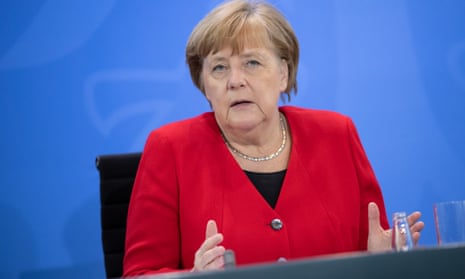Angela Merkel has introduced some new ground rules for relaxing physical-distancing restrictions in an attempt to reassert her authority over Germany’s 16 federal states, some of whom have announced unilateral re-opening plans.
In recent days the German chancellor has struggled to preserve a fragile compromise over the introduction of nationwide lockdown measures bartered with federal states in mid-March.
But during a lengthy video conference on Wednesday afternoon, she managed to rein in some of the regional tearaways by introducing a new “emergency mechanism” that can be triggered to contain local Covid-19 outbreaks.
As latest official figures confirmed that the spread of the virus was slowing in Germany, Merkel and state premiers said people would be allowed to meet and move in public not just with members of their household but also with “persons belonging to one other household”.
Elderly people in risk groups still required “special attention”, Merkel said at a press conference, without categorically ruling out family reunions in smaller groups. The requirement to keep a 1.5m safety distance would remain in place.
However, the German leader said relaxing physical distancing rules would only be possible if the country adhered to a new “emergency mechanism”, whereby hospitals, care homes or entire municipalities would be put under lockdown if they accumulatively registered more than 50 new infections per 100,000 inhabitants within seven days.
If the consensus over lockdown measures appeared to have slipped from Merkel’s grasp in recent days, the new emergency mechanism represents a small victory for the chancellor following opposition from the northern city states of Hamburg and Bremen.
“We have to be careful that this thing doesn’t slip from our grasp,” Merkel said. She said Germany was following a “very open and brave path” by having avoided a stricter lockdown of the kind applied in France, Italy or Spain.
Further steps in the lockdown exit strategy involve the reopening of shops including department stores and shopping malls, as well as a phased reopening of restaurants and bars with new hygiene requirements by 22 May.
The German football league’s first and second division will restart “in the second half of May”, with the German football association to rule on Thursday whether games will kick off on the weekend of 15 or 22 May.
The decision on whether to reopen restaurants, hotels, cinemas, theatres and concert halls – and if so, when, and under what restrictions – has been delegated to the 16 federal governments.
Nurseries will expand emergency care to beyond families where parents qualify as “essential workers”. Elderly people in care homes will be able to select a “reference person” that is allowed to pay them visits.
The latest official figures in Germany appear to show that the first steps to relax physical-distancing restrictions have not had the dramatic impact on infection rates some had originally feared.
The number of new infections has in recent days repeatedly stayed below 1,000 and the virus’s reproduction number has stayed below one. Merkel spoke of a “very, very good development”.
